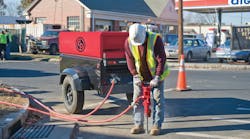We have all heard the old adage: "An ounce of prevention is worth a pound of cure." That could not be more relevant than when it is applied to equipment, particularly portable air compressors.
This equipment is typically used in dusty, harsh conditions, and that makes it that much more important to have a plan.
Since portable air compressors typically don't require an enormous amount of upkeep, it is easy to overlook the importance of a daily, weekly, monthly and annual maintenance plan.
SIMPLE MAINTENANCE STEPS
Here are a few simple maintenance steps to follow to ensure the longevity of your machine.
Daily:
- Take a quick walk around the compressor to check for leaks. Make sure that you don't see any fluids pooled underneath the machine.
- Power up the compressor and check the indicators to make sure the machine is ready to go before every use.
- Fill up the tank with enough fuel that you can make it through the day. Anytime you open your fuel tank, you welcome the opportunity for dirt and debris to enter your system. Do your best to minimize that.
- Always check the tires before moving the unit.
- Wipe down the intake vents. The cleaner you keep these, the easier it is on the compressor's filtration system.
Weekly:
- Take a good hard look at the compressor's hoses. Any cracked or leaky hoses need to be replaced right away.
- Check the oil levels. Keep in mind that a drastic change in levels from the week before could indicate other issues.
- Tighten all bolts. If you work on rough terrain, and if you run a compressor long enough, the fasteners can eventually come loose. Be sure to stay ahead of this, as rattling components shorten the life of the compressor.
- Air filters: Depending on usage, you will want to take a look at the air filter restriction indicators daily, and the filters themselves on a weekly basis.
Monthly:
- Take a moment to test the automatic shutdown system to make sure it is fully functional.
- Perform a visual check of the engine and make sure there is no evident wear to the components. Replace parts if needed.
Annually:
- The separator element is the part of the compressor that filters oil from compressed air. Depending on usage, this will need to be changed about every year.
- Clean the fuel tank. While you're taking some time to inspect and change out parts in your portable air compressor, it is a good time to flush and clean the fuel tank.
By investing a little bit of time into your portable air compressor on a daily, weekly, monthly and yearly basis, you are ensuring a long and productive life for your equipment.
In addition to keeping your compressor running longer, a comprehensive maintenance plan will also keep your equipment running at peak performance, which will affect your bottom line in a big way.



